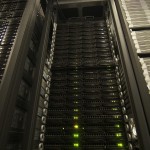At ISC 2016 this week, SGI announced that Total’s SGI ICE X supercomputer, Pangea, was recognized as the industry’s top commercial supercomputer in the prestigious TOP500 list. “Our SGI ICE XA systems lead in delivering application performance in both homogeneous systems and hybrid systems with CPUs and accelerators,” said Gabriel Broner, vice president and general manager, high-performance computing at SGI. “Our production supercomputers continue to enable our customers to innovate and lead in their field, and occupy prominent positions in the prestigious TOP500 list.”
SGI Provides Total with Improved Modeling to Support Decision Making
Total, one of the largest integrated oil and gas companies in the world, announced they are boosting the compute power of their SGI Pangea supercomputer with an additional 4.4 petaflops provided by a new SGI ICE X system and based on the Intel Xeon processor. Purchased last year, the new SGI system is now in production and will allow Total to determine the optimal extraction methods more quickly. The SGI supercomputer allows Total to improve complex modeling of the subsurface and to simulate the behavior of reservoirs, reducing the time and costs associated with discovering and extracting energy reserves.
Long Live the King – The Complicated Business of Upgrading Legacy HPC Systems
“Upgrading legacy HPC systems relies as much on the requirements of the user base as it does on the budget of the institution buying the system. There is a gamut of technology and deployment methods to choose from, and the picture is further complicated by infrastructure such as cooling equipment, storage, networking – all of which must fit into the available space. However, in most cases it is the requirements of the codes and applications being run on the system that ultimately define choice of architecture when upgrading a legacy system. In the most extreme cases, these requirements can restrict the available technology, effectively locking a HPC center into a single technology, or restricting the application of new architectures because of the added complexity associated with code modernization, or porting existing codes to new technology platforms.”
SUSE Powers 2.5 Petaflop Pangea Supercomputer at Total
SuSe reports that Energy giant Total relies increasingly on HPC to find opportunities in an ocean of seismic data.





